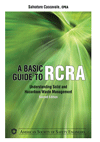I think it's time to challenge old assumptions about safety participation. It's not a thankless job requiring self-sacrifice or a special degree of altruism. Instead, let's assume that helping others reaps personal gains for everyone involved. This behavior is not sacrificial, nor even unselfish. It rewards a basic human need to make a difference - to serve others. In other words, serving others is self-rewarding, not self-sacrificing, because it meets three basic needs.
1) Competence
Several researchers of human motivation have proposed that people naturally enjoy being able to solve problems and successfully complete worthwhile tasks. The label for this fundamental human motive is "competence."
Motivational psychologists assume that the desire for competence is self-initiating and self-rewarding. Behavior that increases feelings of effectiveness is self-directed and does not need extrinsic reinforcement to keep it going.
2) Self-efficacy
This past May, myISHNarticle introduced self-efficacy, and my followingISHNarticle (June 2001) focused on the use of this concept in designing effective fear appeals. Having self-efficacy means the participant believes he or she can organize and perform the procedures needed to achieve a desired goal. When people learn specific procedural steps for carrying out a particular safety process, they gain self-efficacy. They feel competent.3) Response-efficacy
But it's not enough to feel competent at a task - we need to believe our participation contributes to making a beneficial difference. Thus, effective training not only teaches step-by-step procedures, it includes a rationale for why the process is useful.
In safety, we must convince participants that applying the lessons learned will help people remain injury-free.
Power of feedback
So how do we know we are competent at something? How do we know our competence makes a valuable difference?You know the answer - feedback.
Feedback about our ongoing behavior tells us how we are doing and enables us to do better. Sometimes this feedback comes naturally, such as when we see our behavior produce a desired result. But often behavioral feedback requires careful and systematic observation by another individual, a trainer or coach, who later communicates his or her findings to the performer. In each case, feedback enables us to develop self-efficacy and fulfill our need for competence.
A new perspective
Instead of calling on guilt or sacrifice to get people involved in procedures to eliminate hazards or decrease at-risk behavior, let's assume that people are naturally motivated to make beneficial differences. People hate feeling incompetent or helpless. They want to learn, to discover, to become more proficient at worthwhile tasks. People want opportunities to ask questions, to study pertinent material, to work with people who know more than they do, and to receive feedback that can increase their competence.
Safety participation puts people in control of environmental and human factors that can cause serious injury or death. It avoids one of the most aversive human states - the feeling of incompetence or helplessness. Participation in an effective safety process provides opportunities to satisfy a basic human need - the need for competence. And effective and frequent delivery of behavior-based feedback provides a mechanism for improving the quality of safety participation, as well as cultivating feelings of competence throughout a work culture.


